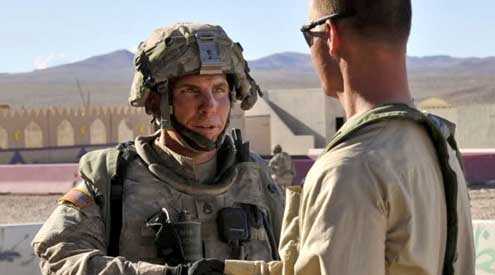
U.S. Army seeks death penalty for Bales in 16 Afghan killings

Staff Sgt. Robert Bales, left, is shown during an exercise at the National Training Center in Fort Irwin, California, Aug. 23, 2011. | U.S. Army Photo/MCT
The Joint Base Lewis-McChord soldier charged with killing 16 Afghan civilians, including nine children, will be put on trial for his life, the Army announced Wednesday.
A spokesman said a military jury would have to find Staff Sgt. Robert Bales guilty of all 34 specifications, or counts, against him before it could impose the death penalty. Bales, 39, faces charges of premeditated murder and numerous lesser offenses stemming from the March 11 massacre in two southern Afghanistan villages.
The Army said the trial will be held at Lewis-McChord at an undetermined date. Bales, formerly of Lake Tapps, remains jailed at the detention center at the base south of Tacoma.
Bales and other Stryker soldiers from the 3rd Brigade, 2nd Infantry Division had been temporarily assigned to a Special Forces team away from their usual chain of command when he allegedly carried out the killings.
The murder of a large number of Afghan civilians in their homes by a single U.S. service member was unprecedented during the decade-long war and put an immediate strain on U.S.-Afghan relations.
Lt. Gen. Robert Brown, commanding general of I Corps and Lewis-McChord, referred the case to a full court-martial after reviewing the report and recommendations of an investigating officer following an eight-day evidence hearing in November.
A Lewis-McChord spokesman said the officer’s report would not be released due to the ongoing investigation. Brown was unavailable for comment Wednesday.
Bales’ civilian lawyer, John Henry Browne of Seattle, told The Associated Press he met with Army officials last week to argue his client shouldn’t face the possibility of capital punishment, given that Bales was serving his fourth deployment in a war zone after being diagnosed with post-traumatic stress disorder and other injuries that could affect his judgment.
Bales, originally from Norwood, Ohio, had served three previous combat tours to Iraq – all with Lewis-McChord’s 3rd Brigade. The brigade recently returned from Afghanistan.
“The Army is trying to take the focus off the failure of its decisions, and the failure of the war itself, and making Sgt. Bales out to be a rogue soldier,” Browne told the AP.
Bales’ wife, Kari, said in a written statement released shortly after the Army announcement that her husband and father of two must be presumed innocent until found guilty.
“My husband is entitled to a fair trial,” her statement said. “That’s what I was taught this country is about since I was a child, and it is what my own babies will be taught as they grow up. I no longer know if a fair trial for Bob is possible, but it very much is my hope and I will have faith.”
Much of evidence heard during last month’s hearing is likely to be reintroduced during the court-martial. Afghan witnesses who testified previously via video conference would have to appear in person during the trial as Bales has a constitutional right to face his accusers.
Witnesses testified during the hearing that Bales expressed unhappiness with his home life and looked to avenge an attack the prior week that took the leg of a fellow soldier.
Witnesses said Bales returned to the outpost between the attacks on the two villages to wake and tell a fellow soldier that he “shot up some people.” The soldier didn’t believe him. After turning himself in, Bales reportedly told soldiers, “I thought I was doing the right thing.”
A forensic expert testified the blood of four people was identified on Bales’ clothing and weapons after he turned himself in. Thirteen Afghan witnesses recalled the scene of an American soldier methodically shooting villagers. One 14-year-old villager testified how the soldier ignored frantic pleas of “we are children” and shot one of them. Soldiers also testified that a bloodied Bales returned alone to the outpost that morning.
But the defense honed in on testimony to push its theory that Bales wasn’t the lone shooter. One widow reported she heard the voices of several American soldiers around her home.
Bales’ lawyers also raised the possibility the evidence might have been tainted. An investigator testified that his team could not reach the homes Bales allegedly attacked for three weeks because of security concerns.
In addition to the stress of multiple deployments, defense attorneys have suggested Bales’ judgment could have been impaired by steroids, alcohol and sleeping pills he was taking and by a head injury from an earlier deployment.
Eugene Fidell, who teaches military justice at Yale Law School, said it could be years before the case reaches a conclusion.
“This is going to a long, drawn-out affair, unless, of course, Staff Sgt. Bales make some sort of an agreement with the government (before trial) that takes death off the table, and that is often the way these things unfold,” he said.
A plea deal would let the government avoid significant costs to try the case, and Bales’s defense attorneys would avoid putting their client’s fate in the hands of a jury.
“Why would you play Russian roulette with the legal system?” Fidell asked.
The court-martial will comprise two phases: trial and, if there’s a conviction, penalty. If the jury finds Bales guilty on all counts, it also must unanimously agree there was an aggravating factor, such as multiple or child victims, and that it outweighs any mitigating circumstances.
Any death penalty case is automatically appealed to the Army Court of Criminal Appeals. From there, the verdict can be challenged before the Court of Appeals for the Armed Forces and then the U.S. Supreme Court, although Fidell said appeals before the nation’s highest court are rare.
The U.S. president also must personally approve carrying out a death sentence.
http://www.mcclatchydc.com/2012/12/20/v-print/177968/us-army-seeks-death-penalty-for.html
